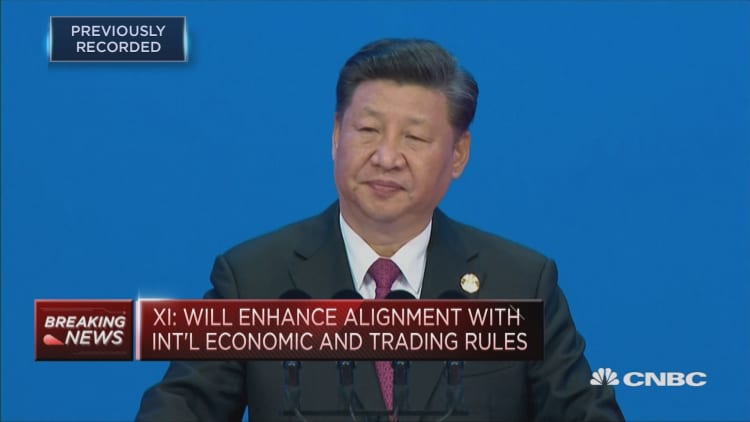
Chinese President Xi Jinping announced plans on Tuesday to open up the Chinese economy, including lowering tariffs for autos and other products and enforcing the legal intellectual property of foreign firms.
Xi's comments come amid escalating trade tensions between China and the U.S. as the world's two largest economies take turns announcing punitive trade measures against each other.
The World Trade Organization said Tuesday that China filed a complaint challenging President Donald Trump's tariffs on imported steel and aluminum. It said China has requested 60 days of consultations with the United States on the steel and aluminum dispute. If that fails, Beijing could request a ruling from a panel of trade experts, The Associated Press reported.
In a speech at the Boao Forum for Asia, an annual summit that's been dubbed the "Asian Davos," Xi said China will take the initiative to expand imports this year and "work hard" to import products that are required by the population.
"China does not seek [a] trade surplus. We have a genuine desire to increase imports and achieve greater balance of international payments under the current account," Xi said, according to a translation of the speech.
Beyond that, he described China as a country upon which other nations had imposed unfair trade penalties: "We hope developed countries will stop imposing restrictions on normal and reasonable trade of high-tech products and relax export controls on such trade with China," he said, not naming any specific country.
In his speech, the Chinese president sold a vision of China as a benevolent leader of the global economy, emphasizing that open systems are the best course of action for the world.
"We must refrain from seeking dominance and reject the zero-sum game, we must refrain from 'beggar thy neighbor' and reject power politics or hegemony while the strong bully the weak," Xi said.
Instead, he said, countries should "stay committed to openness, connectivity and mutual benefits, build an open global economy, and reinforce cooperation within the G-20, APEC and other multilateral frameworks. We should promote trade and investment liberalization and facilitation, support the multilateral trading system."
"This way, we will make economic globalization, more open, inclusive, balanced and beneficial to all," he added.
China will continue to open up to the rest of the globe, he said.
One way is by pushing China's state intellectual property office this year to step up law enforcement of relevant laws, Xi said.
"We encourage normal technological exchanges and cooperation between Chinese and foreign enterprises and protect the lawful [intellectual property] owned by foreign enterprises in China," he said.
Trump is taking Beijing to task over China's large trade deficit with the U.S., which Washington says is in part due to unfair trade practices.
Last week, Trump asked U.S. trade officials to consider another $100 billion in tariffs on Chinese goods. China's commerce ministry, for its part, said it would "fight back with a major response" if provoked.
Earlier in the year, the U.S. imposed tariffs on solar panels and steel and aluminum imports.
China, in turn, implemented additional tariffs on 128 U.S. products, including fruit and pork, in response to the Trump administration's decision to impose duties on steel and aluminum. It also announced extra tariffs on 106 U.S. products last week, although no start date was given for those measures.
Trump said in a tweet on Sunday that China will remove trade barriers because that was the "right thing to do." The president also expressed optimism that the countries would strike a deal on intellectual property.
'Belt and Road'
In his speech, Xi downplayed any geopolitical ambitions China may have beyond its shores regarding the Belt and Road Initiative — an infrastructure and investment program widely seen as an attempt by China to construct a massive, multinational zone of economic and political influence that has Beijing at its center.
While the project may be initiated by China, the opportunities and outcomes will benefit the world, said Xi.
"China has no geopolitical calculations, seeks no exclusionary blocs and imposes no business deals on others," the Chinese president added.
—CNBC's Cheang Ming contributed to this report.


